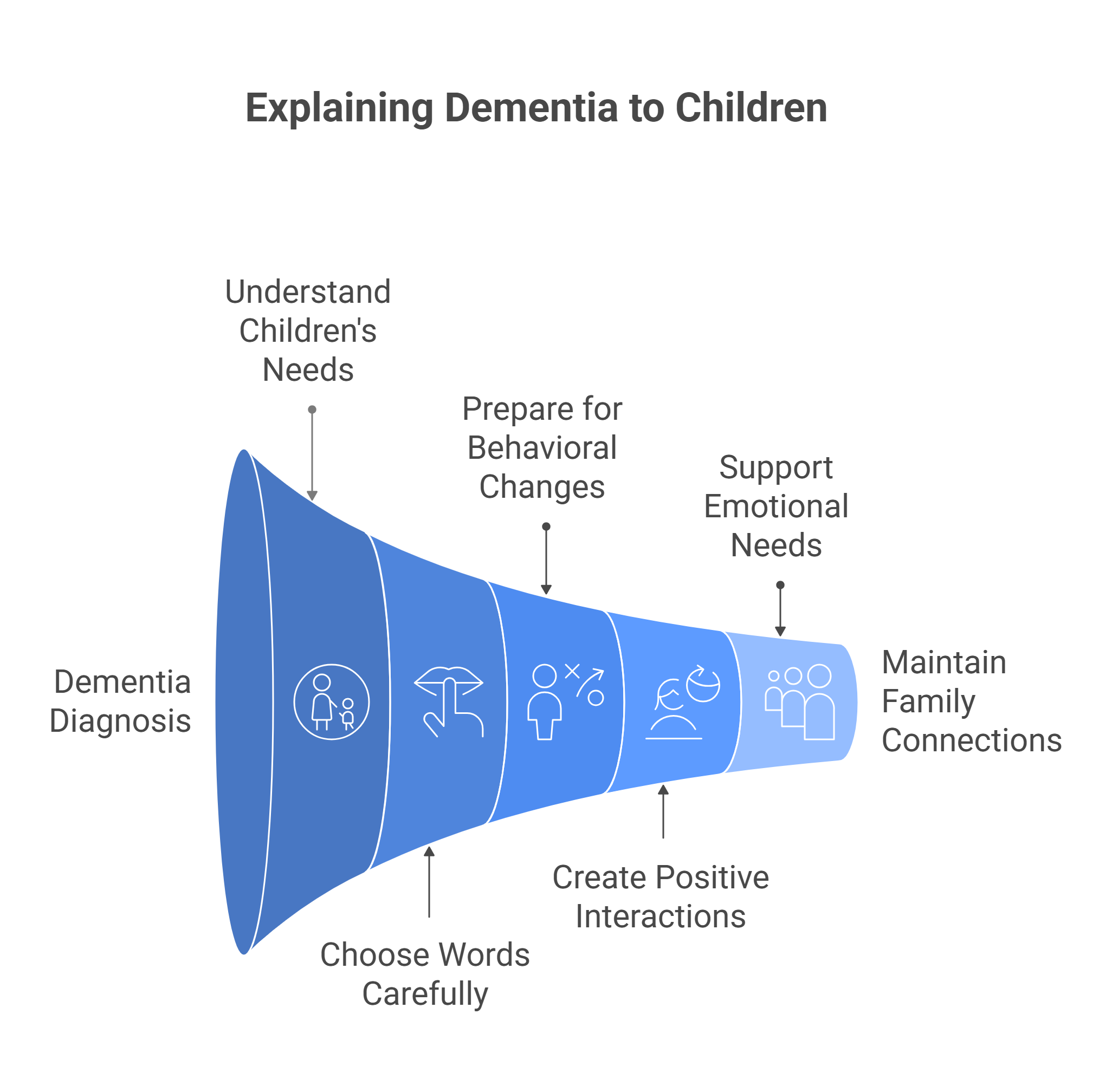Table of Content
When a grandparent or senior loved one receives a dementia diagnosis, families face the difficult task of explaining this complex condition to children and teens. Open, honest conversations help young people understand what’s happening and prepare them for the changes ahead.
Understand What Children Need to Know
Different age groups require different approaches when discussing dementia. Young children bThe family will work together to keep everyone safe and cared for.etween ages four and eight need simple, concrete explanations that focus on observable changes. They might notice Grandma forgets their names or repeats the same questions, but they don’t need detailed medical information.
Elementary-age children (9 to 12) can handle slightly more complex explanations about how the brain works and why dementia affects memory and behavior. They often worry about whether the condition is contagious or if they caused it somehow, so reassurance becomes essential.
Teenagers can understand more sophisticated concepts about brain diseases and may want to research the condition independently. They might also feel embarrassed about their loved one’s behavior or fear about genetic risks.
Key points to address with all age groups include:
- Dementia is a brain disease, not a normal part of aging.
- The person still loves them even when he or she doesn’t remember things.
- It’s not anyone’s fault this happened.
- The family will work together to keep everyone safe and cared for.
Dementia is a serious health condition. If your senior loved one needs help managing an illness or assistance with daily tasks, make sure you choose a top-rated provider of in-home care. Home Care Assistance is here to help your loved one live a happier and healthier life in the golden years. From the mentally stimulating activities in our Cognitive Therapeutics Method to our friendly Care Managers who are available to answer your questions 24 hours a day, we offer a wide array of high-quality at-home care services.
Choose Your Words Carefully
The language you use significantly impacts how children process this information. Avoid frightening terms like “brain damage” or “losing their mind.” Instead, use phrases like “Grandpa’s brain isn’t working as well as it used to” or “the part of Grandma’s brain that helps with memory is sick.”
For younger children, simple analogies work well. You might compare the brain to a computer that’s having trouble saving files or explain that memories are like books in a library where some pages have become hard to read.
With teenagers, you can be more direct about the progressive nature of the disease while still maintaining hope and focusing on what the family can do together. Acknowledge their concerns about the future and validate any difficult emotions they might experience.
Prepare Kids for Behavioral Changes
Children often have more difficulty with personality and behavioral changes than memory loss itself. Explain that dementia can make people feel confused, frustrated, or scared, which might cause them to act differently than before.
Prepare children for specific scenarios they might encounter. Their loved one might:
- Not recognize them sometimes
- Repeat stories or ask the same questions multiple times
- Become upset or agitated more easily
- Need help with basic tasks like eating or getting dressed
Role-playing different situations can help children practice patient, kind responses. Teach them simple strategies like speaking slowly and clearly, avoiding arguments about facts, and redirecting conversations when their loved one becomes confused.
Consider hiring a professional caregiver if you need someone to provide care to your loved one. There are many reasons seniors might need assistance at home. Some may require regular mental stimulation due to a dementia diagnosis, while others might only need part-time assistance with exercise and basic household tasks. Home Care Assistance is a leading Richmond senior care provider. Families rely on our expertly trained caregivers to help their senior loved ones maintain a high quality of life.
Create Positive Interaction Opportunities
Despite the challenges dementia presents, children can still form meaningful connections with affected family members. Focus on activities that don’t rely heavily on memory or complex cognitive skills.
Successful activities often include:
- Looking through old photo albums together
- Listening to familiar music from their loved one’s youth
- Simple crafts or coloring projects
- Taking short walks in familiar places
- Sharing favorite snacks or treats
Encourage children to follow their loved one’s lead during visits. Some days might be better than others for interaction, and that’s completely normal. Teaching children to be flexible and patient helps them maintain positive relationships even as the disease progresses.
Support Your Children’s Emotional Needs
Children may experience a wide range of emotions when learning about a loved one’s dementia diagnosis. Common reactions include sadness, fear, anger, or confusion about why this is happening to their family.
Create safe spaces for children to express their feelings without judgment. Some children benefit from talking openly about their concerns, while others might prefer expressing themselves through drawing, writing, or play.
Consider connecting children with support resources designed specifically for their age group. Many communities offer support groups for children affected by dementia, and online resources can provide additional age-appropriate information and coping strategies.
Remember your children’s understanding and emotional responses will evolve over time as they mature and as their loved one’s condition progresses.
Maintain Family Connections and Routines
When specialized dementia care becomes necessary, whether through home care services or adult day programs, explain to children how these changes will keep everyone safe while allowing their loved one to stay connected to the family.
Help children understand that trained caregivers know special ways to communicate with people who have dementia and can provide activities designed to reduce confusion and maintain comfort. Emphasize that seeking professional help demonstrates love and care, not abandonment.
Maintain regular family routines and traditions as much as possible, adapting them when necessary to accommodate changing needs. This consistency helps children feel secure during a time when many things might feel uncertain.
If you’re looking for reliable dementia care, Richmond Home Care Assistance offers high-quality at-home care for seniors who are managing the challenges of cognitive decline. We offer a revolutionary program called the Cognitive Therapeutics Method (CTM), which uses mentally stimulating activities to boost cognitive health in the elderly. CTM has proven to help seniors with dementia regain a sense of pride and accomplishment and learn how to engage with others in an enjoyable way. To learn more about our premier in-home care plans, call us at (804) 207-4746 today.

